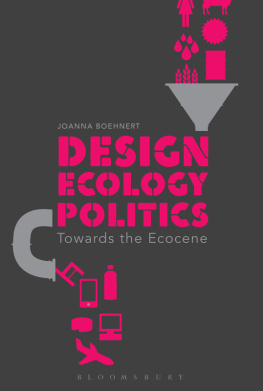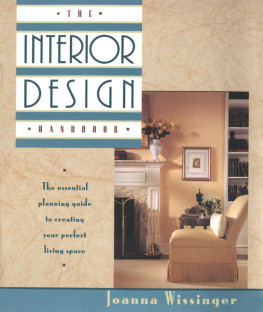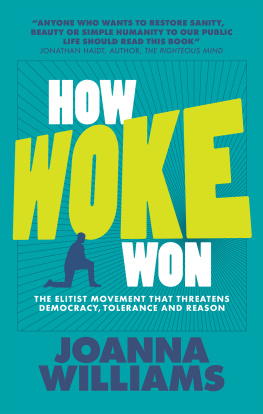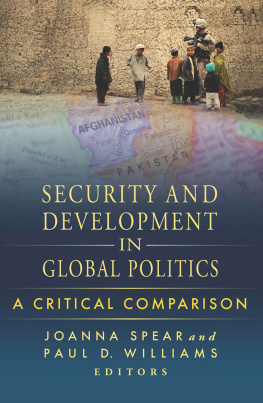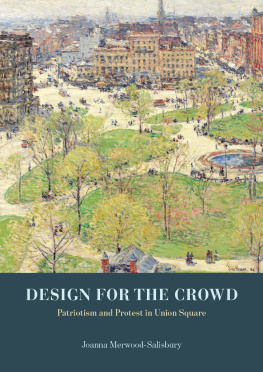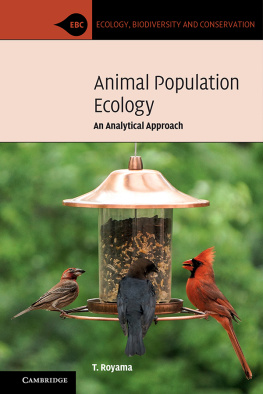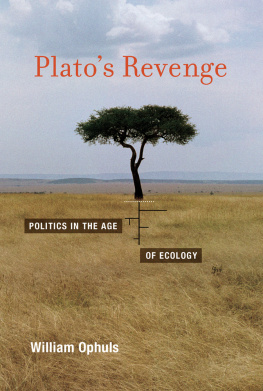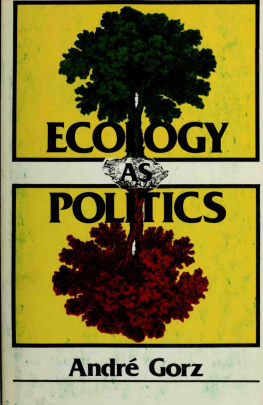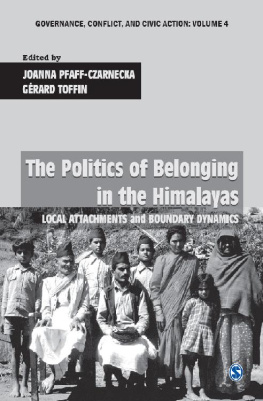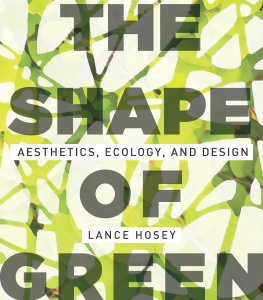Joanna Boehnert - Design, Ecology, Politics: Towards the Ecocene
Here you can read online Joanna Boehnert - Design, Ecology, Politics: Towards the Ecocene full text of the book (entire story) in english for free. Download pdf and epub, get meaning, cover and reviews about this ebook. year: 2018, publisher: Bloomsbury UK, genre: Politics. Description of the work, (preface) as well as reviews are available. Best literature library LitArk.com created for fans of good reading and offers a wide selection of genres:
Romance novel
Science fiction
Adventure
Detective
Science
History
Home and family
Prose
Art
Politics
Computer
Non-fiction
Religion
Business
Children
Humor
Choose a favorite category and find really read worthwhile books. Enjoy immersion in the world of imagination, feel the emotions of the characters or learn something new for yourself, make an fascinating discovery.
- Book:Design, Ecology, Politics: Towards the Ecocene
- Author:
- Publisher:Bloomsbury UK
- Genre:
- Year:2018
- Rating:5 / 5
- Favourites:Add to favourites
- Your mark:
- 100
- 1
- 2
- 3
- 4
- 5
Design, Ecology, Politics: Towards the Ecocene: summary, description and annotation
We offer to read an annotation, description, summary or preface (depends on what the author of the book "Design, Ecology, Politics: Towards the Ecocene" wrote himself). If you haven't found the necessary information about the book — write in the comments, we will try to find it.
Design, Ecology, Politics: Towards the Ecocene — read online for free the complete book (whole text) full work
Below is the text of the book, divided by pages. System saving the place of the last page read, allows you to conveniently read the book "Design, Ecology, Politics: Towards the Ecocene" online for free, without having to search again every time where you left off. Put a bookmark, and you can go to the page where you finished reading at any time.
Font size:
Interval:
Bookmark:
Design, Ecology, Politics
Design, Ecology, Politics is a powerful contribution. It is a thoroughly innovative, provocative and confrontational approach to pressing twenty-first century challenges at the humanenvironment interface. Boehnert has produced a compelling book which expands our considerations of design and ecological literacy in the complex socio-economic systems where we find home. I enthusiastically recommend this work to those interested in charting productive and sustainable pathways through todays ecological, social and cultural challenges.
Maxwell Boykoff, Associa sor of Environmental Studies at the University of Colorado-Boulder, USA
Design, Ecology, Politics commands design educators to ground their practice in critically engaged ecological literacy. Boehnerts deeply textured and carefully crafted clarion call should be read by all who design on our earth. And it is a must for current and future planners.
Christopher Silver, Professor of Urban and Regional Planning at the University of Florida, USA
Design, Ecology, Politics
Towards the Ecocene
Joanna Boehnert
Bloomsbury Academic
An imprint of Bloomsbury Publishing Plc

This book is the product of a decades worth of work formulating a stronger ecological theory for design. It started as my doctoral research at the University of Brighton. I am grateful to the Arts and Humanities Research Council who provided the funding that made this initial work possible. I am indebted to my PhD supervisors Jonathan Chapman and Julie Doyle for help nurturing the ideas embedded in this book. Later, during a post-doc at the Cooperative Institute for Research in Environmental Sciences (CIRES) at the University of Colorado Boulder, Max Boykoff provided constructive encouragement at the book proposal stage. Back in the UK, I worked as a gardener at Tapeley Park with permaculture legend Jenny Hayns while writing the first draft. The final version was written during my time as a part-time Research Fellow at the Centre for Research and Education in Arts and Media (CREAM) at the University of Westminster. I must thank Tom Corby and Christian Fuchs for their intellectual support over this period. Many others have helped with ideas, critique, collaborations and help accessing funding over the years. Among them are Emma Dewberry, Guy Julier, Karin Jaschke, Isis Nunez Ferrera, Jon Goodbun, Doug Specht, Rosie Thomas, Bianca Elzenbaumer, Idil Gaziulusoy, Jonathan Crinion, Christopher Pierce, Donal ODriscoll and Damian White. I would like to express my special appreciation to Michael Reinsborough who provided invaluable feedback, editing and suggestions on issues of the environment, science and technology. Although ideas in this book may have their origins from conversations with many people, any errors or shortcomings are my own.
I owe a great deal to social movements that have informed my understanding of environmental problems, social justice and socio-political change. Thanks to Paul Chandler who provided the solar and wind power at Climate Camp, taught me how to approach energy issues critically and arranged hiking holidays. Thanks to Noel Douglas, Tony Credland, Lazaros Kakoulidis, Tzortzis Rallis and Bianca Elzenbaumer for their work creating new forms of design activism and politicizing design theory and practice. I am also grateful to Lazaros and Tzortzis for their artwork that was developed into the cover of this book. Thanks to Angela Morelli for her artwork The Steady State Economy: A Totem of Real Happiness and to all designers who contributed artwork for this book. I want to thank to everyone at Bloomsbury who helped put this book into production especially Manikandan Kuppan, Ken Bruce, Abbie Sharman, Claire Constable and Rebecca Burden.
My family and friends have provided indispensable encouragement and support. My father Gunnar taught me how to consider historical context and this outlook is integral to the perspective taken in this book. Thanks to those who graciously provided me with friendly temporary homes during the international moves over the time this book was written: Gunnar and Krystyna Boehnert; my sister Jennifer Boehnert and Joel Davis, Lana Pitkin and Uro Raikovi; Mel MacDonald and Damian Bubicz; Adele Green; Jayne Quinton; Alex Burden; Rebecca Cheeham and Culam Nelson; Becky Heuberger and Piers Windsor; Ruth Winstanley and Phil Neale; Richie Kearon; Paul Chandler; Jenny Haynes; Brennan Linsley; Pj Damico; and Barley Massey. A special thanks to Alan King for the all the times he has been there for me over these years.
Finally, this book would not exist if I was not so inspired by my late mother, also Joanna Boehnert (born Bartlett), who died in a car crash in 2001. My love for her sits with more complicated feelings behind some of my motivations to write. I am compelled to articulate the tensions that troubled my relationship with her generation of feminists in ways that also acknowledge my gratitude to them and my respect for the work they did struggling against very different conditions than the ones I encountered. The world changed radically thanks to their work, but not nearly enough! Fortunately, many young people today have a more thorough analysis of power, exploitation and structural violence than those who had the privilege of inheriting a more stable climate and access to cheap fossil fuel energy. We will need better ideas than the ones that created the various problems we are facing. This book is dedicated to millennials and those who come after them.
Whether or not we are interested in the environment or identify with the concept of being an environmentalist each of us is entirely dependent on the air we breathe, the food we eat and the environment we inhabit for life. Despite this basic fact, statements about our connections with nature are often interpreted as platitudinous and widely dismissed. We have inherited a highly reductive intellectual tradition and anti-ecological worldview in profound denial of our fundamental interdependence with nature. We are embedded within non-human nature and dependent on ecological systems for life, but our belief systems do not reflect this basic relationship. Consequently, the world we have designed is deeply unsustainable.
Fragmentary thinking is an obstacle to sustainability. Reductive attitudes towards knowledge cannot address problems associated with complex ecological systems or social and economic problems for that matter. In response to this dilemma, ecological literacy provides an integrated foundation for the understanding of environmental problems and potential solutions. Unfortunately, ecological literacy has largely failed to spread across disciplinary boundaries in over two decades since the concept was first conceived, and it remains marginal in education, policy and practice. All too often it is absent in places where it is desperately needed such as the disciplines responsible for the design of sustainable futures. In this book, I focus on what ecological literacy means for communication design, although many ideas will be relevant for other design disciplines and of interest to anyone concerned with designing sustainable ways of living.
Design serves a social and political function that is not always acknowledged within the design industry. While there are prominent movements in design working towards socially responsive practice, these efforts are hampered by the manner in which power relations are reproduced by design and the lack of analysis of these dynamics. Design is a practice that functions to mediate social relations. Typically, it reproduces the values and priorities of those who determine which design problems are to be addressed. The interests of powerful groups are manifested in design.
Next pageFont size:
Interval:
Bookmark:
Similar books «Design, Ecology, Politics: Towards the Ecocene»
Look at similar books to Design, Ecology, Politics: Towards the Ecocene. We have selected literature similar in name and meaning in the hope of providing readers with more options to find new, interesting, not yet read works.
Discussion, reviews of the book Design, Ecology, Politics: Towards the Ecocene and just readers' own opinions. Leave your comments, write what you think about the work, its meaning or the main characters. Specify what exactly you liked and what you didn't like, and why you think so.

